China Military
Saying Goodbye to “Uncle Wang”: Wang Wenbin Becomes Chinese Ambassador to Cambodia
There are thriving fan forums filled with thousands of posts and videos dedicated to Wang Wenbin.
Published
10 months agoon

When China’s Ministry of Foreign Affairs (MFA) Spokesperson Wang Wenbin concluded a regular press conference on May 24, he suddenly said “farewell” (“我们再见”) and stepped down to shake hands with reporters. This surprising moment quickly had his online fan circles buzzing. Was he leaving? Starting a new job? Everyone was speculating.
Wang Wenbin (汪文斌, b. 1971), the Deputy Director of the Foreign Ministry Information Department of China, has been with the Foreign Ministry since 1993. His face became familiar to many both inside and outside China after he took on the role of MFA spokesperson in 2020.
Over the years, Wang has become increasingly popular on social media. There are thriving fan forums filled with thousands of posts and videos dedicated to Wang, praising his professionalism and humorous expressions.
Although there were no official reports on Wang leaving his post, hundreds of netizens began saying goodbye to their favorite diplomat.
Nearly two weeks later, on June 4th, it was announced that Wang will be starting as China’s new ambassador to Cambodia. A related hashtag went trending on Weibo (“Wang Wenbin Appointed as Ambassador to Cambodia” #汪文斌候任驻柬埔寨大使#), attracting over 130 million views within a day.
“Anhui’s Pride”
Why is Wang so popular?
First, his popularity is part of a larger trend of Chinese diplomats being admired and idolized online, a phenomenon detailed in our article here (link).
But besides being part of China’s “Diplomat Dream Team” (外交天团), Wang is admired for his conduct and character. He appears very serious but often shows a smile. He is highly professional, yet occasionally displays a playful side.
These likeable contrasts in his persona also reflect his background. While Wang represents international China, he comes from a small village. Born and raised in Xindu in Tongcheng, Anhui, Wang studied at China’s Foreign Affairs University, majoring in French and economics. He speaks several foreign languages, including English, and once sent out New Year’s wishes in 11 different languages. His success story makes him “Anhui’s pride.”
While Zhao Lijian was known as a real ‘wolf warrior diplomat,’ Wang Wenbin’s style is perceived as more “calm,” “scholarly,” and “refined,” though he remains critical, firm, and assertive. For instance, Wang rebuffed U.S. claims that China might arm Russian troops in the Ukraine war, stating, “it is the United States and not China that is endlessly shipping weapons to the battlefield.” He also called the shootdown of the alleged Chinese spy balloon “100 percent hysteria” and urged the United States to abandon its “hegemonic” approaches to international affairs.
For many Wang Wenbin fans, his assertive yet ‘refined’ (‘温文尔雅’) foreign policy resonates deeply, as they appreciate how Wang shapes China’s image abroad: “It’s the perfect interpretation of being a great and elegant great power.”
Wang’s large fanbase on Chinese social media is always creative in editing images of him and adding quotes. In response to the news of Wang’s new position, a flood of new videos popped up in Wang Wenbin fan communities. Many see Wang as relatable, likeable, and a role model, often saying that ‘Uncle Wang’ (汪叔) is just too “cool.”
“We’ve got your back”
Wang’s role as China’s ambassador to Cambodia is not entirely new to him. He has previously worked in various positions at Chinese embassies in Senegal, Cameroon, and Mauritius, and served as ambassador to Tunisia from 2018 to 2020.
Cambodia is an important regional ally to China, and Sino-Cambodian ties have grown stronger, exemplified by the two countries holding a 15-day joint military exercise in May of this year. Cambodia is a key country for China’s strategic layout in Southeast Asia.
Many netizens are pleased to see Wang Wenbin appointed to Cambodia, though some complain that his “talent is wasted on an insignificant role” (“大材小用” dà cái xiǎo yòng). However, others recognize the growing strategic importance of Cambodia and see Wang’s appointment as a reflection of his significance to China; they suggest he is the right man in the right place.
Wang’s loyal fans wish him nothing but the best in his new position. One person posted: “No matter where you are, we’ve got your back, Uncle Wang.”
Wang Wenbin will replace Wang Wentian (王文天), who served as Chinese Ambassador to Cambodia since November 2018.
Although Wang Wenbin’s online fan communities might become a bit quieter from now on, one thing is certain: he won’t be forgotten. One fan wrote: “From now on, we’ll continue to watch you shine.”
By Manya Koetse
Spotted a mistake or want to add something? Please let us know in comments below or email us. First-time commenters, please be patient – we will have to manually approve your comment before it appears.
©2024 Whatsonweibo. All rights reserved. Do not reproduce our content without permission – you can contact us at info@whatsonweibo.com.
Manya is the founder and editor-in-chief of What's on Weibo, offering independent analysis of social trends, online media, and digital culture in China for over a decade. Subscribe to gain access to content, including the Weibo Watch newsletter, which provides deeper insights into the China trends that matter. More about Manya at manyakoetse.com or follow on X.

China Food & Drinks
China Trending Week 11: The Yang Braised Chicken Scandal, Haidilao Pee Incident, Taiwan Tensions
What’s been trending on Weibo and beyond? I doomscrolled Chinese social media so you don’t have to.
Published
2 weeks agoon
March 13, 2025
Here’s the latest roundup of the three top trends and most noteworthy discussions on Chinese social media this week.
🍚🤢Yang’s Braised Chicken Rice Scandal
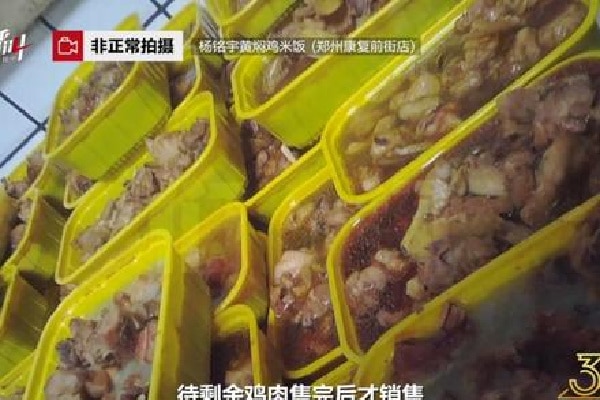
The popular Chinese franchise Yang’s Braised Chicken Rice (杨铭宇黄焖鸡米饭) is at the center of attention this week—for all the wrong reasons. The company, which opened its first restaurant in 2011 and has since franchised more than 2500 locations across China, was exposed by Beijing News for reusing expired ingredients and reselling leftover food in at least three of its restaurants in Zhengzhou and Shangqiu (Henan). Cooks were smoking in the kitchen and even going as far as dyeing spoiled, darkened beef with food coloring to make it appear fresh.
The issue has sparked widespread concern on Chinese social media—not only because Yang’s Braised Chicken Rice is a well-known restaurant chain, but also because food safety and kitchen hygiene remain ongoing concerns in China. The timing of this news is particularly significant, as it was published in the lead-up to March 15—China’s National Consumer Rights Day, an annual event that highlights consumer protection issues.
China’s State Council Food Safety Commission Office has now ordered authorities in Henan and Shandong, where Yang’s Braised Chicken is headquartered, to thoroughly investigate the case. The affected stores will reportedly be closed permanently, but the impact extends far beyond these locations—most netizens discussing the scandal have made it clear they won’t be ordering from Yang’s Braised Chicken Rice anytime soon.
Can the company win back consumer trust? Even though general management has been apologizing and pledged to personally oversee kitchen standards, this is not the first time the company is in hot water. In 2024, a customer in Chengdu allegedly ordered Yang’s Braised Chicken Rice via takeout and discovered a fully cooked dead rat in their meal (picture here not for the faint of heart).
🇹🇼⚔️Beijing Angrily Responds to Lai Ching-te’s Speech: “Pushing Taiwan Towards the Danger of War”
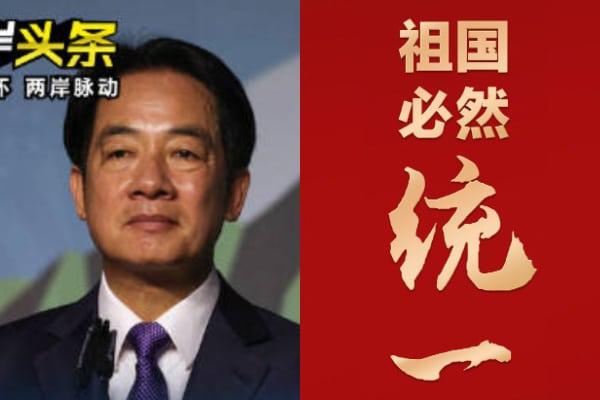
While tough language on Taiwan was already trending last week during China’s Two Sessions, another wave of discussions on Taiwan has emerged this week. This follows a high-level national security meeting held on Thursday by Taiwanese President Lai Ching-te (赖清德), after which he addressed the media and proposed more aggressive strategies to counter Beijing’s so-called ‘united front’ efforts within Taiwan.
On Friday, Beijing responded with stern remarks. Chen Binhua (陈斌华), spokesperson for the Taiwan Affairs Office of the State Council, called Lai Ching-te a “destroyer of cross-strait peace” (“两岸和平破坏者”) and a “creator of crises in the Taiwan Strait” (“台海危机制造者”) who is “pushing Taiwan towards the dangerous situation of war” (“把台湾推向兵凶战危险境”).
Chen also reiterated Beijing’s stance that reunification with Taiwan is inevitable. This message was further amplified on Chinese social media platforms such as Weibo and Douyin through the hashtag “Inevitable Reunification with the Motherland” (#祖国必然统一#).
🔥🚽Haidilao’s “Pissgate”
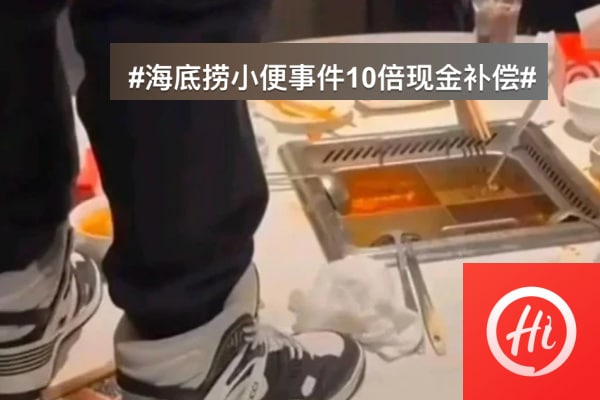
Last week, on March 6, a peculiar news item went viral on Chinese social media, and I tweeted out the viral video here. The footage shows a young man standing on a table in a private dining room at a Haidilao restaurant, seemingly urinating into the hotpot. The incident was later confirmed to have taken place at the popular chain’s Bund location in Shanghai on the night of February 24.
Just when you thought the world couldn’t get any crazier… someone stands up and pisses in the Haidilao hotpot. Blasphemy! Hotpot treason!
Anyway, Haidilao reported the guy to the police, and I’m pretty sure he won’t be welcome back anytime soon. pic.twitter.com/3ytLhGdYjX
— Manya Koetse (@manyapan) March 6, 2025
Honestly, the video seemed staged (the “pee” looked more like water), but understandably, Haidilao was very pissed about the negative impact on its reputation. In case you’re not familiar: Haidilao is one of China’s most popular hotpot chains, known for its excellent service and food quality (read here).
The company immediately launched an investigation into the video’s origins and reported the two men—the one urinating and the one filming—to the police.
This week, the incident gained even more traction (even the BBC covered it) after it was revealed that Haidilao had reimbursed 4,109 customers who dined at the restaurant between February 24, when the incident occurred, and March 8, when all tableware was discarded and the entire restaurant was disinfected.
Not only did Haidilao reimburse customers, but they also compensated them tenfold.
This compensation strategy sparked all kinds of discussions on Chinese social media. While many agreed with Haidilao’s solution to prevent a marketing crisis, some customers and netizens raised ethical questions, such as:
💰If you paid for your meal with coupons and only spent a couple of cents in cash, is it fair that some customers only received 9 RMB ($1.25) in compensation?
💰If you paid for an entire group of friends, meaning you originally spent around $140 on a meal but now received $1,400 in reimbursement, should you split the compensation with your friends?
💰How should cases be handled where a third party made the reservation and ends up claiming part of the compensation?
By now, the incident has become about much more than just pissing in soup.
By Manya Koetse
(follow on X, LinkedIn, or Instagram)
Spotted a mistake or want to add something? Please let us know in comments below or email us. First-time commenters, please be patient – we will have to manually approve your comment before it appears.
©2025 Whatsonweibo. All rights reserved. Do not reproduce our content without permission – you can contact us at info@whatsonweibo.com.
China Insight
US-Russia Rapprochement and “Saint Zelensky”: Chinese Online Reactions to Trump’s Shake-Up
From shifting sentiments on Zelensky to a renewed focus on Taiwan, recent geopolitical developments have sparked noteworthy takes from Chinese online commentators.
Published
3 weeks agoon
March 9, 2025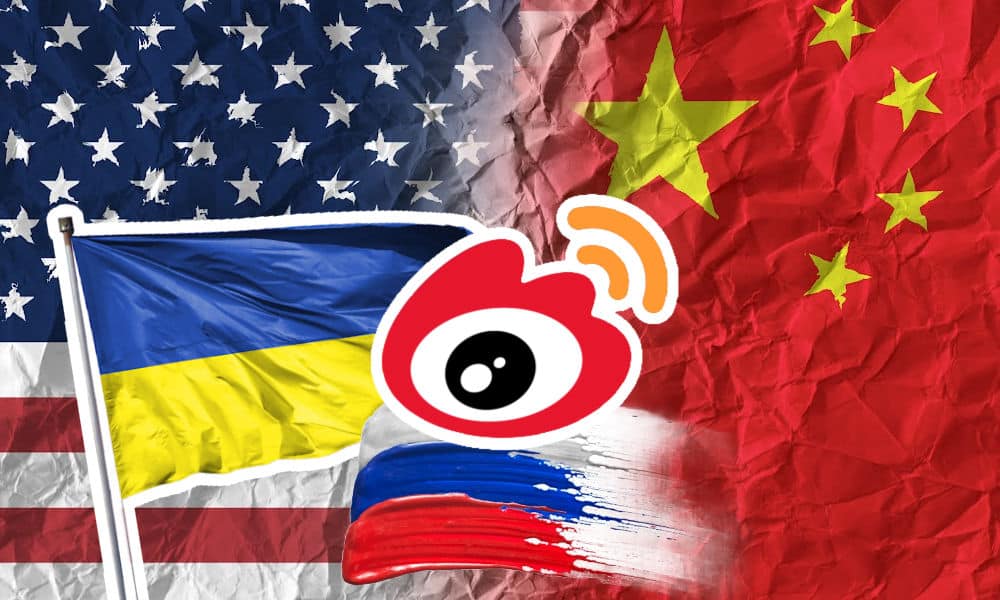
As the Russia-Ukraine war enters its fourth year, Chinese social media is once again flooded with discussions about the geopolitical shifts triggered by Trump’s policies. From the Oval Office clash to Trump’s ‘pivot’ to Russia, this article explores how Chinese netizens are interpreting the rapidly changing geopolitical landscape.
Three years ago, when the Russia-Ukraine war first broke out, one particular word went trending on Chinese social media: wūxīn gōngzuò (乌心工作). The term was a wordplay on the term wúxīn gōngzuò (无心工作), meaning not being in the mood to work, and it basically meant that people were too focused on Ukraine to concentrate on work.
Although that word has since faded from use online, recent geopolitical developments surrounding the Russia-Ukraine war have once again drawn considerable attention on Chinese social media, where trending word data tools show that “Trump” and “Zelensky” are among the hottest buzzwords of the moment.
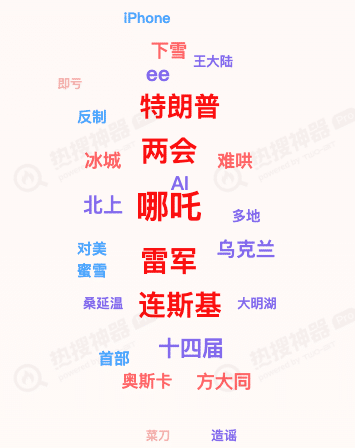
Trump Zelensky, Ne Zha, Lei Jun; biggest words of interest on, among others, Weibo, on March 4, 2025.
Trump’s recent rhetoric toward Russia, his remarks about Ukraine, and his attitude toward NATO not only mark a shift from Biden and decades of US policy, but also reshuffle the geopolitical cards and raise questions about the future of the postwar international order.
Where does China stand in all this?
➜ Although China’s online environment is tightly controlled, particularly regarding political discussions, what stands out in conversations around the recent developments involving Trump, Putin, and Zelensky is a widespread sentiment that — at its core — it’s all about China.
Many believe that China’s rise on the global stage, and the resulting US-China rivalry, are key forces shaping US strategy toward Russia as well.
Woven into these discussions are US-China trade tensions, with Trump increasing tariffs by 10% on February 1, and then doubling the tariff on all Chinese imports to 20% from 10% on March 4. This immediately prompted China to retaliate with 10-15% tariffs on US agricultural products, effective March 10.
Currently, developments are unfolding so rapidly that one hashtag after another is appearing on Chinese social media. “It’s not that I don’t understand, it’s just that the world is changing so quickly,” one Weibo blogger commented, referencing a famous song by Cui Jian (“不是我不明白,是这世界变化快”).
Amid this whirlwind of events, let’s take a closer look at the current Chinese online discourse surrounding the Russia-Ukraine war, with a focus on shifting attitudes toward Zelensky and US-Russian relations.
THE OVAL OFFICE INCIDENT
“Saint Zelensky is a real man!”
One major moment in the recent developments has been the clash between Zelensky, Trump, and US Vice President JD Vance in the White House Oval Office on February 28.
Zelensky had come to the White House to discuss the US’s continued support against Russia and a potential deal involving Ukraine’s rare earth minerals, but it ended in a heated confrontation during which, among others, Zelensky questioned Vance’s notion of “diplomacy” with Putin, and Trump and Vance expressing frustration with what they perceived as Zelensky’s ingratitude for US support.
On Chinese social media, the clash between Zelensky, Trump, and Vance in the Oval Office seemingly caused a shift in public views towards Zelensky and the position of Ukraine. Some commentators who are known to usually take a pro-Russian stance were suddenly positive about Zelensky.
“Zelensky is really awesome, he had a confrontation with Putin’s two top negotiators in the Oval Office and still managed to hold his own,” historian Zhang Hongjie (@张宏杰) jokingly wrote on Weibo.
Others compared compared Trump and Vance to “two dogs barking” at Zelensky, and saw the meeting as one that was meant to humiliate Zelensky.
Nationalist blogging account “A Bad Potato” (一个坏土豆, 335k+ followers) admitted: “I’ll lay my cards on the table: I fully support Zelensky.”
He further wrote:
💬 “Let’s not make any illusions. Trump’s ultimate target is China. (..). He’s already added two rounds of 10% tariffs on China. Isn’t it obvious? Did you think he is pulling closer to Russia for some big China-Russia-America unification? Once he’s done dealing with his internal problems, he’ll inevitably come at China with full force. There are some people here who are hoping for Zelensky to kneel before the US, and I’d like to ask these people: Whose side are you on? Are you on the Russian or American side? When Zelensky’s firm towards the US, of course I’ll support him. His performance was so perfect that I’d like to call him Saint Zelensky!
(..) Some say Zelensky’s betraying his country. So what if he is? As long as he’s not selling out China, he can sell out the whole world for all I care. Just look at the stupid and bad Macron, or Starmer who’s full of sneaky tricks, they’re getting humiliated by Trump in all kinds of ways. Then look at Zelensky again and let me shout: Saint Zelensky is a real man! He’s a tough guy! Of course, I’m keeping it balanced here—I support Russia too. Both sides must make an effort.”
➜ Although there is some pragmatism in this ‘pro-Zelensky’ shift, which is Sino-centric and mostly based on which actors in the political game are considered antagonists of China, there is also another level of sympathy towards Zelensky as the underdog in this situation — facing a 2-against-1 dynamic on unfamiliar terrain, while speaking a language that is not his.
Weibo user “Uncle Bull” (@牛叔, 820k followers) wrote:
💬 “The arguing scene in the Oval Office should be a reminder for every politician that it doesn’t matter how well you speak English, when it’s a formal occasion, you should always speak your native language and have a translator with you— it helps avoid a lot of direct confrontations.”
In his analysis of the situation, well-known political commentator Chairman Rabbit (兔主席) took a far more critical stance towards Zelensky, suggesting that his confrontational attitude in the Oval Office was misplaced and driven by personal pride, and that his actions in the White House caused it to be “the most disastrous trip in history.”
Chairman Rabbit also commented:
💬 “There is an ancient Chinese saying: “A man of character can bow or stand tall as required [大丈夫能屈能伸].” When it comes to major issues like the survival of the nation, things like some dignity and righteousness and principles all are meaningless. When facing Trump, you just have to flatter and appease him. If Zelensky is unable to humble himself, then he’s probably not suited for this job. It’s just as the most pro-Ukraine Republican senator, Senator Lindsey Graham, said – he suggests that Zelensky should step down, and Ukraine should find someone else to negotiate.”
But there are many netizens who do not agree with him, like this popular comment saying: “Whatever you do, don’t kneel [to Trump] — you’re a spiritual totem (精神图腾) for so many people on Weibo.”
TRUMP’S ‘PIVOT’ TO RUSSIA
“The US-Russia honeymoon has begun”
When US and Russian delegates sat down in Riyadh, Saudi Arabia, on February 18 to discuss improving Russia-US relations and ending the war in Ukraine—without Europe or Ukraine at the table—Chinese netizens pointed out that there were no plates on the table, joking that “Europe and Ukraine are what’s on the menu.”
They referred to a comment previously made by US Secretary of State Antony Blinken when replying to a question about US-China tensions leading to greater fragmentation: “If you’re not at the table in the international system, you’re going to be on the menu.”
The official Chinese response to the developments, as stated by Chinese Foreign Ministry spokesperson Guo Jiakun (郭嘉昆), is that China is glad to see any efforts that contribute to peace, including any consensus reached between the US and Russia through negotiations (#中方回应俄美代表团举行会晤#).
Among social media users, there was banter about the sudden US-Russia rapprochement, after news came out that the two countries intend to cooperate on various matters concerning their shared geopolitical interests (#俄美决定未来将在多领域合作#).
“The US-Russian honeymoon has begun [美俄蜜月开始]!” some commenters concluded.
“It won’t last more than four years,” others predicted.
Some suggested it might be an opportunity for China and Europe to draw closer: “China and Europe will also cooperate on various matters.”
Regarding Putin agreeing to assist in US-Iran talks (#美媒爆普京同意协助美促成与伊朗核谈判#), reactions were cautiously optimistic: “It’s hard to find an American president seeking peace as much as Trump is,” one Weibo user wrote. Another added: “He might be pursuing ‘America First,’ but his efforts for peace deserve some acknowledgement. I hope it’s true.”
➜ Outside of China, analysts and commentators have argued that a US-Russia rapprochement could be bad for China, suggesting it might undermine the close strategic partnership between China and Russia. However, this sentiment seems less pronounced on Chinese social media, where many argue US-Russian relations are bound to be fickle, while others echo the official stance.
The official response to such concerns, as stated by Ministry of Foreign Affairs spokesperson Lin Jian (林剑), is that the China-Russia bilateral relationship “will not be affected by any third party”:
💬 “Both China and Russia have long-term development strategies and foreign policies. No matter how the international landscape changes, our relationship will move forward at its own pace. The US attempt to sow discord between China and Russia is doomed to fail.”
Another perspective comes from Chinese political scientist and commentator Zheng Yongnian (郑永年), in a recent interview with Xiakedao (@侠客岛), a popular commentary account from People’s Daily Overseas Edition.
Zheng noted that the US-Russia shift is not surprising—considering, among other things, Trump’s previous comments about his good relationship with Putin—but that it places Ukraine and Europe in an unfavorable position.
➜ Like other commentators, Zheng suggests that Trump’s strategy to improve ties with Russia is also linked to gaining leverage over China. However, he does not necessarily view it as a direct revival of Kissinger’s famous Cold War-era strategy, which aimed to align with China to counter the Soviet Union. In this case, it would be reversed: allying with Russia to counter China (“联俄抗中”). In Trump’s view, Zheng argues, Europe doesn’t matter, and Ukraine is insignificant. Russia is the key to maximizing US interests.
➜ Like others—and in contrast to some foreign analyses—Zheng does not see the U.S.-Russia rapprochement as necessarily harmful to China. Instead, he suggests that right-wing, pragmatic partners may ultimately be more beneficial to China than left-wing ideological ones, stating:
💬 “When it comes to the Russia-Ukraine conflict, the previous Biden administration continuously tried to frame China, attempting to shift the blame onto China. So now, after the US and Russian leaders spoke, the Chinese Ministry of Foreign Affairs responded by saying they are ‘pleased to see all efforts working for peace, including Russia and the US coming to a common understanding that will lead to peace.’ China won’t meddle in another country’s internal affairs. No matter who’s in power, we will engage with them. China can indeed take a relatively neutral stance.
In the past, we said, ‘It’s easier to deal with the right-wing in the West.’ Why? Because the political right is less hypocritical; they value interests, and interests can be exchanged. Some Western left-wing factions, however, cling to ideological patterns, labeling and defining you, making exchange and interaction impossible.”
SHARPENED FOCUS ON TAIWAN
“Ever since Trump came to power and betrayed Ukraine, the rhetoric towards Taiwan has become increasingly tough”
Although there may be mixed views and different analyses, one thing is certain: Trump’s strategies are shaking things up from how they used to be.
➜ One thing that doesn’t change in rapidly changing times, is an overall anti-American sentiment on Chinese social media.
Even though some commenters appreciate Trump’s pragmatism or are entertained by the spectacle of US politics from the sidelines, there remains a strong belief that US strategies are ultimately aimed against China. This reinforces anti-American sentiments and fuels discussions about a potential US-China conflict.
This is especially tangible at a time when the US government has once again raised tariffs on Chinese imports.
“If war is what the U.S. wants—be it a tariff war, a trade war, or any other type of war—we’re ready to fight till the end,” China’s embassy in Washington posted on X, reiterating a government statement from Tuesday.
During the Two Sessions on March 7, Foreign Minister Wang Yi (王毅) also commented on US-China relations, stating:
💬 “No country should harbor the illusion that it can suppress and contain China on one hand while seeking to develop a good relationships with China on the other. Such two-faced behavior [两面人] is not only detrimental to the stability of bilateral relations and cannot build mutual trust.”
➜ Against this backdrop, the Taiwan issue has once again come into sharp focus.
This is partly driven by the two Two Sessions (March 5-11), China’s annual gathering of the National People’s Congress (NPC) and the Chinese People’s Political Consultative Conference (CPPCC). This is not just a major political event but also a key moment for propaganda and political messaging.
But it is mostly linked to the broader, rapidly changing geopolitical sphere and Trump’s shifting stance on Russia and Ukraine. The narrative of US power politics failing to change the course of a China-Taiwan “reunification” is surfacing again precisely because of Trump’s reshuffling of alliances.
Since the Russian invasion of Ukraine in 2022, Chinese social media users have frequently drawn comparisons between Taiwan and Ukraine. The phrase “Today’s Ukraine, tomorrow’s Taiwan?” gained traction at the time, as online commenters saw Ukraine’s rapid invasion as a cautionary tale for Taiwan, highlighting how quickly the situation could change. A viral meme from that period depicted a pig labeled “Taiwan” watching another pig, “Ukraine,” being slaughtered.
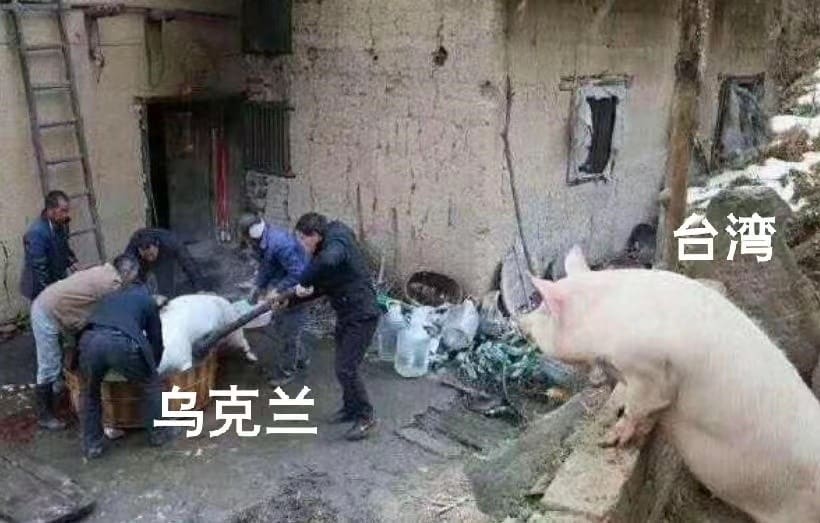
A meme circulating on social media in 2022 showing a pig “Taiwan” watching the slaughtering of another pig “Ukraine.”
This week, Chinese state media launched a large-scale social media propaganda campaign using strong language and clear visuals to reinforce the narrative that Taiwan is not a country, that it is part of China, and that reunification is inevitable.

Such rhetoric has appeared before, with similar peaks in Taiwan propaganda dating back to at least 2022. The topic of Taiwan has often been amplified during key political events, such as the 20th Party Congress and Xi Jinping’s speech in October 2022.
“Have you noticed?,” Weibo author Yangeisaibei (@雁归塞北) wrote: “Ever since Trump came to power and sold out Ukraine, the rhetoric towards Taiwan has become increasingly tough, the tones become more stern, and the words more straightforward.”
According to prominent Weibo blogger @前HR本人, who has over two million followers, the Taiwan issue is now more important than before.
💬 “When it comes to foreign struggles, resolving the Taiwan issue is China’s top priority. Judging from the Chinese Embassy in Washington declaring “We are not afraid of any kind of war with the US”, it seems we are already preparing to reunify Taiwan at any moment.”
Another Weibo blogger (@王江雨Law, 419k fans) wrote:
💬 “Now that all kinds of big and smaller developments are changing the [political] climate, especially if America’s strong territorial expansion claims turn into concrete actions, this could trigger synchronous reactions, greatly increasing the possibility of resolving the Taiwan issue within a few years. We need to rethink the previous view that the mainland is not in a hurry on this matter.”
What emerges from these discussions is that Chinese online discourse on the Russia-Ukraine war and US foreign policy is primarily centered around two key ideas:
🔸 The belief that China is ultimately at the core of US geopolitical strategies in its dealings with Russia.
🔸 A pragmatic, Sino-centric view in which support or opposition to leaders like Trump, Putin, or Zelensky shifts depending on what serves China’s interests best.
Rather than seeing the conflict in black-and-white terms, many Chinese netizens approach it as a dynamic political chess game, one in which China should play a smart and confident strategy.
Politics-focused blogger Mingshuzhatan (@明叔杂谈, 137k followers) wrote:
💬 “In the process of this game against US, we must respect them in tactics, and contempt them in strategy [战术上重视、战略上藐视] – stay patient and confident. Trump is currently going against the tide, he’s being destructive. But actually, this recklessness is damaging US credibility and its global influence, it will accelerate the decline of American hegemony. A silent majority of countries in the international community harbor growing resentment and disappointment toward the US, and when these sentiments reach a tipping point, America will truly experience the pain of “un unjust cause draws little support” [失道寡助]. China, on the other hand, although also facing some challenges, focuses on science and technological and industrial innovation. That’s the right path for China’s long-term stability, prosperity, and security. In the China-US competition, it is becoming increasingly evident that time is on China’s side.”
This perspective reflects a dominant theme across Chinese online discussions: No matter how intense the geopolitical shifts may be, or how much the US reshuffles its global strategy, China remains on its course and is playing the long game.🔚
By Manya Koetse
(follow on X, LinkedIn, or Instagram)
Spotted a mistake or want to add something? Please let us know in comments below or email us. First-time commenters, please be patient – we will have to manually approve your comment before it appears.
©2025 Whatsonweibo. All rights reserved. Do not reproduce our content without permission – you can contact us at info@whatsonweibo.com.
Subscribe

How K-pop Fans and the 13-Year-Old Daughter of Baidu VP Sparked a Debate on Online Privacy

Squat or Sit? China’s Great Toilet Debate and the Problem of Footprints on the Seat

Weibo Watch: The Great Squat vs Sitting Toilet Debate in China🧻

Chinese Netizens Turn to Tim Cook Over Battery Factory’s Illegal Overtime

Revisiting China’s Most Viral Resignation Letter: “The World Is So Big, I Want to Go and See It”

Our Picks: Top 10 Chinese Buzzwords and Phrases of 2024 Explained

“Dear Li Hua”: The TikTok/Xiaohongshu Honeymoon Explained

Beyond the Box Office: What’s Behind Ne Zha 2’s Success?

Weibo Watch: Christmas in China Is Everywhere and Nowhere

Weibo Watch: A New Chapter

15 Years of Weibo: The Evolution of China’s Social Media Giant

Tuning Into the Year of the Snake

The ‘China-chic Girl’ Image and the Realities of China’s Competitive Food Delivery Market

TikTok Refugees, Xiaohongshu, and the Letters from Li Hua

“Black Myth: Wukong”: From Gaming Screens to the CMG Spring Festival Gala?
Get in touch
Would you like to become a contributor, or do you have any tips or suggestions? Get in touch here!
Popular Reads
-

 China Insight11 months ago
China Insight11 months agoThe Tragic Story of “Fat Cat”: How a Chinese Gamer’s Suicide Went Viral
-

 China Music12 months ago
China Music12 months agoThe Chinese Viral TikTok Song Explained (No, It’s Not About Samsung)
-

 China Digital10 months ago
China Digital10 months agoChina’s 2024 Gaokao Triggers Online Discussions on AI
-

 China Arts & Entertainment11 months ago
China Arts & Entertainment11 months agoSinging Competition or Patriotic Fight? Hunan TV’s ‘Singer 2024’ Stirs Nationalistic Sentiments





